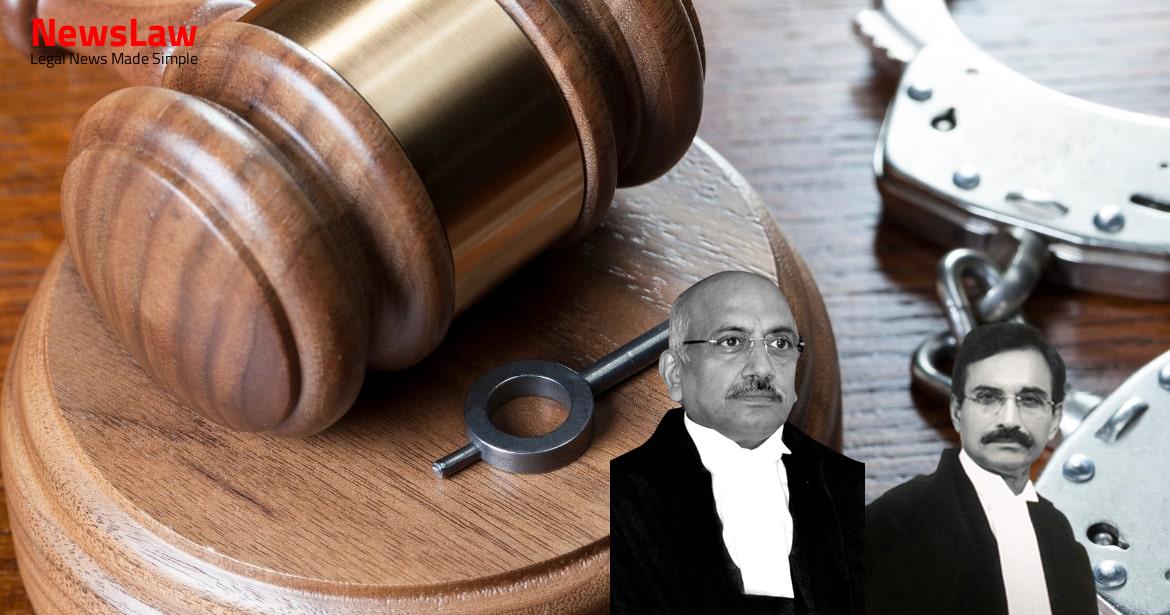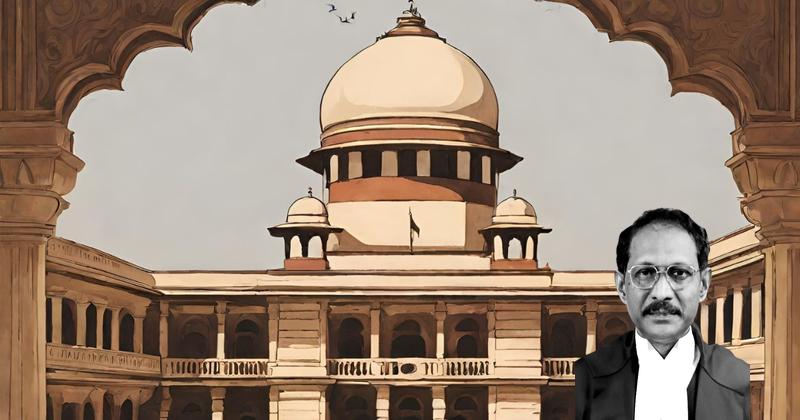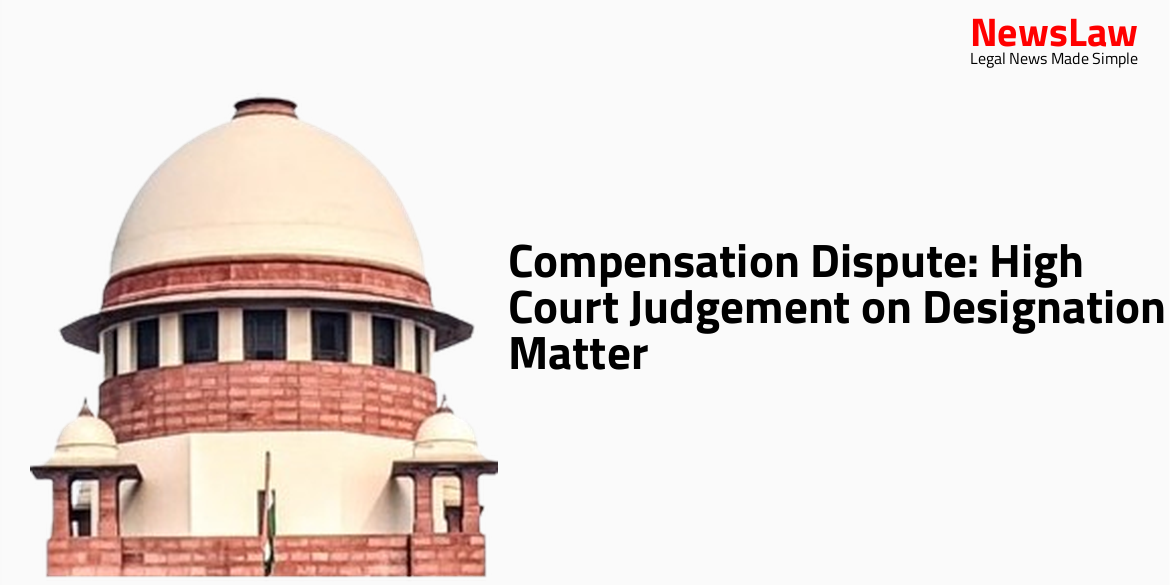Explore a detailed legal analysis of a recent land acquisition case where the court’s interpretation and application of the law significantly shaped the outcome. The case involves complexities surrounding property ownership, government actions, and equitable principles. Gain insights into how the court navigated through various legal doctrines and statutes to arrive at a just decision. Stay tuned for a thorough examination of the legal nuances at play.
Facts
- The Land Acquisition Collector claimed that possession of the land was taken on 24.12.2008, but the DDA stated that possession was not handed over to them.
- An interim order of stay was passed, and the respondents filed SLP (C) No. 17504-08/2007, later converted into Civil Appeal No. 4116-4120/2009.
- The Right to Fair Compensation and Transparency in Land Acquisition Act, 2013 came into force on 01.01.2014, resulting in the withdrawal of Civil Appeal No 4116-4120/2009 by the respondents.
- A writ petition was filed based on the lapsing of proceedings under the 1894 Act, citing Section 24(2) of the 2013 Act, which was eventually dismissed on 20.08.2007.
Also Read: Legal Analysis of Assignment and Ratification in Property Law
Arguments
- The appellant’s counsel argues that the impugned judgment will not pass the scrutiny of the court based on a later Constitution Bench decision.
- The conduct of the respondents in obtaining interim orders prevented the appellant from taking possession of the property in question, disentitling the respondents from claiming the benefit of the alleged lapsing of proceedings under Section 24(2) of the 2013 Act.
- A notification was issued under Section 3A of the National Highways Act, 1956, on 01.12.2018, including the lands in question, subsequently followed by a declaration under Section 3(D) on 22.03.2019.
- The Collector excluded the lands of the respondents from the final Award on 05.11.2020, as they were already vested, as per the judgment of the Constitution Bench.
- The respondents are not entitled to benefit from the subsequent developments, as they cannot take advantage of orders obtained from the Court and then claim under Section 24(2) of the 2013 Act.
- State cannot acquire land which is already vested with it
- Reference to (2010) 9 SCC 782
Also Read: Interpretation of Custody in Contempt of Court Case
Analysis
- The interim order prevented the appellant from taking possession of the lands, leading to a crucial aspect of the case.
- The subsequent developments during the pendency of the appeal complicated the situation, with the lands being subject to dual vesting.
- The appellant’s right to acquire the land must be upheld, considering the illegalities in the earlier award and subsequent government actions.
- The principle of estoppel cannot be invoked against the appellant, and the respondents should not benefit from delaying tactics or frivolous litigation.
- The judgment of the High Court preventing possession due to interim orders must be set aside to allow the appellant’s rights to prevail.
- The balance of equity favors the appellant, and the consequences of the interim order must be considered in determining the outcome of the case.
- High Court erred in setting aside the Special Land Acquisition Officer’s order declining a reference as government does not acquire its own interest in land acquisition proceedings.
- The Land Acquisition Officer’s actions in awarding compensation and allotting land already belonging to the Government indicate abuse of power.
- The Land Acquisition Act does not allow for the acquisition of Government-owned land.
- The principle of estoppel by conduct is based on good conscience and should prevent unfair outcomes.
- The doctrine of election and the caution about using ‘unconscionable’ as a fix-all must be considered in equitable mitigation.
- The judicial system must discourage undue enrichment or advantage gained through misuse of the court system.
- The restitutionary principle should offset advantages gained by litigants, particularly in cases of undue enrichment.
- Delays in legal proceedings should not benefit wrongdoers or litigants taking advantage of the system.
- A court passing judgment without jurisdiction creates a nullity that can be challenged in execution or collateral proceedings.
- If the award was made within five years excluding the period covered by an interim court order, proceedings will continue as per Section 24(1)(b) of the 2013 Act under the 1894 Act as if it has not been repealed.
- The lands are excluded under the final award as they are already vested.
- Respondents cannot plead equity as they effectively prevented the public authority from enjoying the fruits of law.
- It would go against public interest to compel the government to acquire land that already belongs to it.
- The restitutionary principle mentioned by the Constitution Bench is crucial.
- The appellant must succeed in this case.
- The respondents should be granted an opportunity to file an application seeking enhanced compensation under the earlier Act.
Also Read: NGT Jurisdiction and High Courts’ Role
Decision
- The impugned judgment will stand set aside and the appeal is allowed.
- The impugned judgment was based on the law as it was laid down by the Court.
- The appeal is allowed in terms of the signed reportable judgment.
- Pending applications stand disposed of.
- SLP(C) No 17311/2016 is listed for August 2022 with parties bearing their own costs.
- Applications for condonation of delay in filing substitution, setting aside abatement and substitution are allowed.
- Respondents are permitted to file an application under Section 18 of the 1894 Act within one month.
- Applications will not be dismissed on the ground of delay.
- The order is made in view of giving approval to the Award dated 22.08.2005 under the 1894 Act.
Case Title: DELHI DEVELOPMENT AUTHORITY Vs. BHIM SAIN GOEL AND ORS. (2022 INSC 472)
Case Number: C.A. No.-003151-003151 / 2022



